- Home
- Fyodor Dostoyevsky
The Double Page 8
The Double Read online
Page 8
If any doubtful point were touched upon, for instance, the visitor at once agreed with Mr. Golyadkin's opinion. If by mistake he advanced an opinion in opposition to Mr. Golyadkin's and afterwards noticed that he had made a slip, he immediately corrected his mistake, explained himself and made it clear that he meant the same thing as his host, that he thought as he did and took the same view of everything as he did. In fact, the visitor made every possible effort to "make up to" Mr. Golyadkin, so that the latter made up his mind at last that his visitor must be a very amiable person in every way. Meanwhile, tea was brought in; it was nearly nine o'clock. Mr. Golyadkin felt in a very good-humour, grew lively and skittish, let himself go a little, and finally plunged into a most animated and interesting conversation with his visitor. In his festive moments Mr. Golyadkin was fond of telling interesting anecdotes. So now he told the visitor a great deal about Petersburg, about its entertainments and attractions, about the theatre, the clubs, about Brulov's picture, and about the two Englishmen who came from England to Petersburg on purpose to look at the iron railing of the Summer Garden, and returned at once when they had seen it; about the office; about Olsufy Ivanovitch and Andrey Filippovitch; about the way that Russia was progressing, was hour by hour progressing towards a state of perfection, so that . . .
"Arts and letters flourish here today";
. . . about an anecdote he had lately read in the Northern Bee concerning a boa-constrictor in India of immense strength; about Baron Brambeus, and so on. In short, Mr. Golyadkin was quite happy, first, because his mind was at rest, secondly, because, so far from being afraid of his enemies, he was quite prepared now to challenge them all to mortal combat; thirdly, because he was now in the role of patron and was doing a good deed. Yet he was conscious at the bottom of his heart that he was not perfectly happy, that there was still a hidden worm gnawing at his heart, though it was only a tiny one. He was extremely worried by the thought of the previous evening at Olsufy Ivanovitch's. He would have given a great deal now for nothing to have happened of what took place then.
"It's no matter, though!" our hero decided at last, and he firmly resolved in his heart to behave well in future and never to be guilty of such pranks again. As Mr. Golyadkin was now completely worked up, and had suddenly become almost blissful, the fancy took him to have a jovial time. Rum was brought in by Petrushka, and punch was prepared. The visitor and his host drained a glass each, and then a second. The visitor appeared even more amiable than before, and gave more than one proof of his frankness and charming character; he entered keenly into Mr. Golyadkin's joy, seemed only to rejoice in his rejoicing, and to look upon him as his one and only benefactor. Taking up a pen and a sheet of paper, he asked Golyadkin not to look at what he was going to write, but afterwards showed his host what he had written. It turned out to be a verse of four lines, written with a good deal of feeling, in excellent language and handwriting, and evidently was the composition of the amiable visitor himself. The lines were as follows:
"If thou forget me,
I shall not forget thee;
Though all things may be,
Do not thou forget me."
With tears in his eyes Mr. Golyadkin embraced his companion, and, completely overcome by his feelings, he began to initiate his friend into some of his own secrets and private affairs, Andrey Filippovitch and Klara Olsufyevna being prominent in his remarks.
"Well, you may be sure we shall get on together, Yakov Petrovitch," said our hero to his visitor. "You and I will take to each other like fish to the water, Yakov Petrovitch; we shall be like brothers; we'll be cunning, my dear fellow, we'll work together; we'll get up an intrigue, too, to pay them out. To pay them out we'll get up an intrigue too. And don't you trust any of them. I know you, Yakov Petrovitch, and I understand your character; you'll tell them everything straight out, you know, you're a guileless soul! You must hold aloof from them all, my boy."
His companion entirely agreed with him, thanked Mr. Golyadkin, and he, too, grew tearful at last.
"Do you know, Yasha," Mr. Golyadkin went on in a shaking voice, weak with emotion, "you must stay with me for a time, or stay with me for ever. We shall get on together. What do you say, brother, eh? And don't you worry or repine because there's such a strange circumstance about us now; it's a sin to repine, brother; it's nature! And Mother Nature is liberal with her gifts, so there, brother Yasha! It's from love for you that I speak, from brotherly love. But we'll be cunning, Yasha; we'll lay a mine, too, and we'll make them laugh the other side of their mouths."
They reached their third and fourth glasses of punch at last, and then Mr. Golyadkin began to be aware of two sensations: the one that he was extraordinarily happy, and the other that he could not stand on his legs. The guest was, of course, invited to stay the night. A bed was somehow made up on two chairs. Mr. Golyadkin junior declared that under a friend's roof the bare floor would be a soft bed, that for his part he could sleep anywhere, humbly and gratefully; that he was in paradise now, that he had been through a great deal of trouble and grief in his time; he had seen ups and downs, had all sorts of things to put up with, and--who could tell what the future would be?--maybe he would have still more to put up with.
Mr. Golyadkin senior protested against this, and began to maintain that one must put one's faith in God. His guest entirely agreed, observing that there was, of course, no one like God. At this point Mr. Golyadkin senior observed that in certain respects the Turks were right in calling upon God even in their sleep. Then, though disagreeing with certain learned professors in the slanders thy had promulgated against the Turkish prophet Mahomet and recognizing him as a great politician in his own line, Mr. Golyadkin passed to a very interesting description of an Algerian barber's shop which he had read in a book of miscellanies. The friends laughed heartily at the simplicity of the Turks, but paid dur tribute to their fanaticism, which they ascribed to opium. . . . At last the guest began undressing, and thinking in the kindness of his heart that very likely he hadn't even a decent shirt, Mr. Golyadkin went behind the screen to avoid embarrassing a man who had suffered enough, and partly to reassure himself as far as possible about Petrushka, to sound him, to cheer him up if he could, to be kind to the fellow so that every one might be happy and that everything might be pleasant all round. It must be remarked that Petrushka still rather bothered Mr. Golyadkin.
"You go to bed now, Pyotr," Mr. Golyadkin said blandly, going into his servant's domain; "you go to bed now and wake me up and eight o'clock. Do you understand Petrushka?"
Mr. Golyadkin spoke with exceptional softness and friendliness. But Petrushka remained mute. He was busy making his bed, and did not even turn round to face his master, which he ought to have done out of simple respect.
"Did you hear what I said, Pyotr?" Mr. Golyadkin went on. "You go to bed now and wake me tomorrow at eight o'clock; do you understand?"
"Why, I know that; what's the use of telling me?" Petrushka grumbled to himself.
"Well, that's right, Petrushka; I only mention it that you might be happy and at rest. Now we are all happy, so I want you, too, to be happy and satisfied. And now I wish you good-night. Sleep, Petrushka, sleep; we all have to work . . . Don't think anything amiss, my man . . ." Mr. Golyadkin began, but stopped short. "Isn't this too much?" he thought. "Haven't I gone too far? That's how it always is; I always overdo things."
Our hero felt much dissatisfied with himself as he left Petrushka. He was, besides, rather wounded by Petrushka's grumpiness and rudeness. "One jests with the rascal, his master does him too much honour, and the rascal does not feel it," thought Mr. Golyadkin. "But there, that's the nasty way of all that sort of people!"
Somewhat shaken, he went back to his room, and, seeing that his guest had settled himself for the night, he sat down on the edge of his bed for a minute.
"Come, you must own, Yasha," he began in a whisper, wagging his head, "you're a rascal, you know; what a way you've treated me! You see, you've got my name, do you know that?"
he went on, jesting in a rather familiar way with his visitor. At last, saying a friendly good-night to him, Mr. Golyadkin began preparing for the night. The visitor meanwhile began snoring. Mr. Golyadkin in his turn got into bed, laughing and whispering to himself: "You are drunk today, my dear fellow, Yakov Petrovitch, you rascal, you old Golyadkin--what a surname to have! Why, what are you so pleased about? You'll be crying tomorrow, you know, you sniveller; what am I to do with you?"
At this point a rather strange sensation pervaded Mr. Golyadkin's whole being, something like doubt or remorse.
"I've been over-excited and let myself go," he thought; "now I've a noise in my head and I'm drunk; I couldn't restrain myself, ass that I am! and I've been babbling bushels of nonsense, and, like a rascal, I was planning to be so sly. Of course, to forgive and forget injuries is the height of virtue; but it's a bad thing, nevertheless! Yes, that is so!"
At this point Mr. Golyadkin got up, took a candle and went on tiptoe to look once more at his sleeping guest. He stood over him for a long time meditating deeply.
"An unpleasant picture! A burlesque, a regular burlesque, and that's the fact of the matter!"
At last Mr. Golyadkin settled down finally. There was a humming, a buzzing, a ringing in his head. He grew more and more drowsy . . . tried to think about something very important, some delicate question--but could not. Sleep descended upon his devoted head, and he slept as people generally do sleep who are not used to drinking and have consumed five glasses of punch at some festive gathering.
Chapter VIII
Mr. Golyadkin woke up next morning at eight o'clock as usual; as soon as he was awake he recalled all the adventures of the previous evening--and frowned as he recalled them. "Ugh, I did play the fool last night!" he thought, sitting up and glancing at his visitor's bed. But what was his amazement when he saw in the room no trace, not only of his visitor, but even of the bed on which his visitor had slept!
"What does it mean?" Mr. Golyadkin almost shrieked. "What can it be? What does this new circumstance portend?"
While Mr. Golyadkin was gazing in open-mouthed bewilderment at the empty spot, the door creaked and Petrushka came in with the tea-tray.
"Where, where?" our hero said in a voice hardly audible, pointing to the place which had ben occupied by his visitor the night before.
At first Petrushka made no answer and did not look at his master, but fixed his eyes upon the corner to the right till Mr. Golyadkin felt compelled to look into that corner too. After a brief silence, however, Petrushka in a rude and husky voice answered that his master was not at home.
"You idiot; why I'm your master, Petrushka!" said Mr. Golyadkin in a breaking voice, looking open-eyed a his servant.
Petrushka made no reply, but he gave Mr. Golyadkin such a look that the latter crimsoned to his ears--looked at hm with an insulting reproachfulness almost equivalent to open abuse. Mr. Golyadkin was utterly flabbergasted, as the saying is. At last Petrushka explained that the 'other one' had gone away an hour and a half ago, and would not wait. His answer, of course, sounded truthful and probable; it was evident that Petrushka was not lying; that his insulting look and the phrase the 'other one' employed by him were only the result of the disgusting circumstance with which he was already familiar, but still he understood, though dimly, that something was wrong, and that destiny had some other surprise, not altogether a pleasant one, in store for him.
"All right, we shall see," he thought to himself. "We shall see in due time; we'll get to the bottom of all this . . . Oh, Lord, have mercy upon us!" he moaned in conclusion, in quite a different voice. "And why did I invite him to what end did I do all that? Why, I am thrusting my head into their thievish noose myself; I am tying the noose with my own hands.
Ach, you fool, you fool! You can't resist babbling like some silly boy, some chancery clerk, some wretched creature of no class at all, some rag, some rotten dishcloth; you're a gossip, an old woman! . . . Oh, all ye saints! And he wrote verses, the rogue, and expressed his love for me! How could . . . How can I show him the door in a polite way if he turns up again, the rogue? Of course, there are all sorts of ways and means. I can say this is how it is, my salary being so limited . . . Or scare him off in some way saying that, taking this and that into consideration, I am forced to make clear . . . that he would have to pay an equal share of the cost of board and lodging, and pay the money in advance. H'm! No, damn it all, no! That would be degrading to me. It's not quite delicate! Couldn't I do something like this: suggest to Petrushka that he should annoy him in some way, should be disrespectful, be rude, and get rid of him in that way. Set them at each other in some way. . . . No, damn it all, no! It's dangerous and again, if one looks at it from that point of view--it's not the right thing at all! Not the right thing at all! But there, even if he doesn't come, it will be a bad look-out, too! I babbled to him last night! . . . Ach, it's a bad look-out, a bad look-out! Ach, we're in a bad way!
Oh, I'm a cursed fool, a cursed fool! you can't train yourself to behave as you ought, you can't conduct yourself reasonably. Well, what if he comes and refuses. And God grant he may come! I should be very glad if he did come. . . ."
Such were Mr. Golyadkin's reflections as he swallowed his tea and glanced continually at the clock on the wall.
"It's a quarter to nine; it's time to go. And something will happen! What will there be there? I should like to know what exactly lies hidden in this--that is, the object, the aim, and the various intrigues. It would be a good thing to find out what all these people are plotting, and what will be their first step. . . ."
Mr. Golyadkin could endure it no longer. He threw down his unfinished pipe, dressed and set off for the office, anxious to ward off the danger if possible and to reassure himself about everything by his presence in person. There was danger: he knew himself that there was danger.
"We . . . will get to the bottom of it," said Mr. Golyadkin, taking off his coat and goloshes in the entry. "We'll go into all these matters immediately."
Making up his mind to act in this way, out hero put himself to rights, assumed a correct and official air, and was just about to pass into the adjoining room, when suddenly, in the very doorway, he jostled against his acquaintance of the day before, his friend and companion. Mr. Golyadkin junior seemed not to notice Mr. Golyadkin senior, though they met almost nose to nose. Mr. Golyadkin junior seemed to be busy, to be hastening somewhere, was breathless; he had such an official, such a businesslike air that it seemed as though any one could read his face: 'Entrusted with a special commission.' . . .
"Oh, it's you, Yakov Petrovitch!" said our hero, clutching the hand of his last night's visitor.
"Presently, presently, excuse me, tell me about it afterwards," cried Mr. Golyadkin junior, dashing on.
"But, excuse me; I believe, Yakov Petrovitch, you wanted . . ."
"What is it? Make haste and explain."
At this point his visitor of the previous night halted as though reluctantly and against his will, and put his ear almost to Mr. Golyadkin's nose.
"I must tell you, Yakov Petrovitch, that I am surprised at your behaviour . . . behaviour which seemingly I could not have expected at all."
"There's a proper form for everything. Go to his Excellency's secretary and then appeal in the proper way to the directors of the office. Have you got your petition?"
"You . . . I really don't know Yakov Petrovitch! You simply amaze me, Yakov Petrovitch! You certainly don't recognize me or, with characteristic gaiety, you are joking."
"Oh, it's you," said Mr. Golyadkin junior, seeming only now to recognize Mr. Golyadkin senior. "So, it's you? Well, have you had a good night?"
Then smiling a little--a formal an conventional smile, by no means the sort of smile that was befitting (for, after all, he owed a debt of gratitude to Mr. Golyadkin senior)--smiling this formal and conventional smile, Mr. Golyadkin junior added that he was very glad Mr. Golyadkin senior had had a good night; then he made a slight bow and shuffling a li
ttle with his feet, looked to the right, and to the left, then dropped his eyes to the floor, made for the side door and muttering in a hurried whisper that he had a special commission, dashed into the next room. He vanished like an apparition.
"Well, this is queer!" muttered our hero, petrified for a moment; "this is queer! This is a strange circumstance."
At this point Mr. Golyadkin felt as though he had pins and needles all over him.
"However," he went on to himself, as he made his way to his department, "however, I spoke long ago of such a circumstance: I had a presentiment long ago that he had a special commission. Why, I said yesterday that the man must certainly be employed on some special commission."
"Have you finished copying out the document you had yesterday, Yakov Petrovitch," Anton Antonovitch Syetotchkin asked Mr. Golyadkin, when the latter was seated beside him. "Have you got it here?"
"Yes," murmured Mr. Golyadkin, looking at the head clerk with a rather helpless glance.
"That's right! I mention it because Andrey Filippovitch has asked for it twice. I'll be bound his Excellency wants it. . . ."
"Yes, it's finished. . ."
"Well, that's all right then."
"I believe, Anton Antonovitch, I have always performed my duties properly. I'm always scrupulous over the work entrusted to me by my superiors, and I attend to it conscientiously."
"Yes. Why, what do you mean by that?"
"I mean nothing, Anton Antonovitch. I only want to explain, Anton Antonovitch, that I . . . that is, I meant to express that spite and malice sometimes spare no person whatever in their search for their daily and revolting food. . . ."

 The Eternal Husband
The Eternal Husband Crime and Punishment
Crime and Punishment The Brothers Karamazov
The Brothers Karamazov Notes From Underground
Notes From Underground The Idiot
The Idiot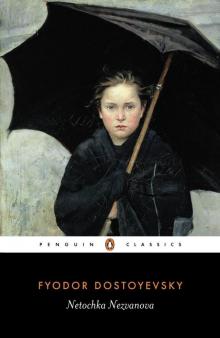 Netochka Nezvanova (Penguin ed.)
Netochka Nezvanova (Penguin ed.)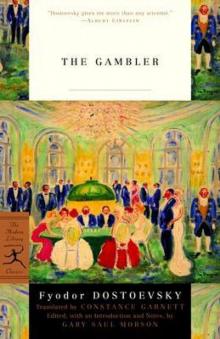 The Gambler
The Gambler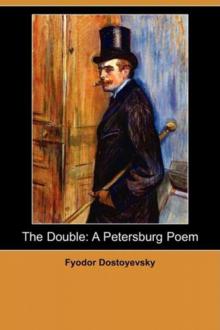 The Double
The Double Poor Folk Anthology
Poor Folk Anthology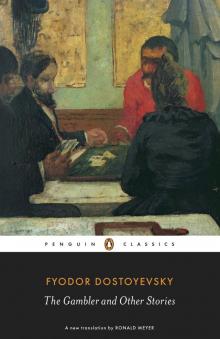 The Gambler and Other Stories (Penguin ed.)
The Gambler and Other Stories (Penguin ed.) Prestuplenie i nakazanie. English
Prestuplenie i nakazanie. English Notes from the Underground
Notes from the Underground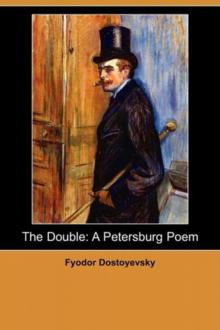 The Double: A Petersburg Poem
The Double: A Petersburg Poem White Nights and Other Stories / The Novels of Fyodor Dostoevsky, Volume X
White Nights and Other Stories / The Novels of Fyodor Dostoevsky, Volume X Complete Works of Fyodor Dostoyevsky
Complete Works of Fyodor Dostoyevsky Poor Folk and Other Stories
Poor Folk and Other Stories The House of the Dead
The House of the Dead